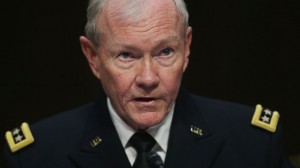Special to WorldTribune.com
WASHINGTON — The United States, citing a strained defense budget, has warned allies against expecting military help.
A senior military official acknowledged that most U.S. allies in the Middle East sought increased American intervention, particularly from the threat of Iran. But the official raised doubts over whether Washington could afford to increase or even maintain U.S. military commitments.

“There is an increasing appetite for our leadership to help maintain the
international order,” Joint Chiefs of Staff chairman Gen. Martin Dempsey
said. “Frankly, our ability to provide this assurance is at risk, due to a
growing deficit between supply and demand.”
In an address on June 25, Dempsey, the highest level military adviser to
the president, said U.S. commitments to the Middle East faced competing
interests from Asia and Europe. The Joint Chiefs chairman, who in June
visited Saudi Arabia and the United Arab Emirates, reaffirmed that the U.S.
military was shrinking amid rising budget deficits.
“Each action comes with greater opportunity costs — that is the
trade-off of some other action somewhere else due to constrained resources,”
Dempsey said.
“Each choice requires us to assess and accept increasing risks
with eyes wide open. This supply/demand imbalance demands that we bring our
military instrument of power back into balance with itself.”
Dempsey said the United States faced different challenges in Asia than
in the Middle East. The general cited rising nationalism in Asia while
Islamic movements, particularly Al Qaida, were shattering national borders
in Iraq and Syria.
“We see the norms of statehood being superseded by centuries-old
religious, ethnic and tribal tensions,” Dempsey said. “As the region wobbles
along a fault time that extends from Beirut to Damascus to Baghdad, state
power continues to ebb.”
Instead, Dempsey called on U.S. allies to form partnerships with
Washington in such areas as intelligence, reconnaissance, ballistic missile
defense and border security. The Joint Chiefs chairman also urged U.S.
allies to lower their expectations of American military power.
“I must be clear about what effects our military can and cannot
achieve,” Dempsey said. “I must represent how fast we can do it, for how
long, at what risk and with what opportunity costs.”

You must be logged in to post a comment Login